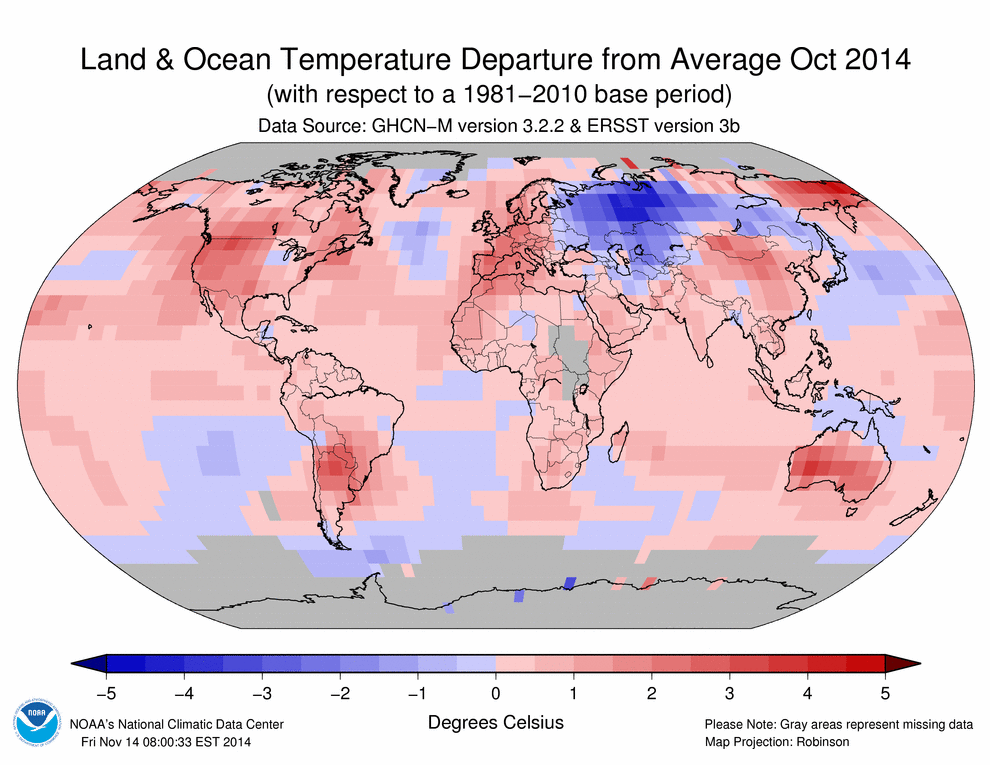Hottest October globally on recordEvery month, NASA, JAXA (the Japanese Meteorological Association)
Hottest October globally on recordEvery month, NASA, JAXA (the Japanese Meteorological Association) and NOAA release reports of the average global temperature, with slight differences between them depending on data availability and what mathematical tools they use to process the data. We’ve covered the last several of these because 2014 keeps breaking records: in all 3 reports, the months of August and September were the warmest of those months ever reported globally.I guess in a grim way this one counts as progress – only 2 of these reports found October 2014 to be the hottest October on record, in the report released by NASA’s Goddard Space Flight Center, October 2014 only tied October of 2005 as the hottest on record to within the 0.1°C error.October 2014 saw global temperatures 0.74°C (1.33°F) above the 20th century average temperature for that month, continuing the trend seen in previous months. According to NOAA data released today and agreed with by the other agencies, 2014 has so far been the warmest January-October period ever recorded on Earth. As we noted a few days ago, this was fed in part by the global oceans being the warmest ever recorded (http://tmblr.co/Zyv2Js1Vqzeem). The Earth continues to be on a pace to record its warmest year ever in all 3 databases barring particularly cold months of November and December.These high temperatures were also recorded on every continent and in every ocean basin – a truly global pattern. It is also noteworthy that these temperatures continue to be high despite the delay or absence of an El Niño event in the Pacific Ocean, which normally drives the warmest years in these datasets. In other words, the warming right now is so extreme that an average year in 2014 shows temperatures hotter than those observed in an El Niño year a decade ago.Although the North American continent is locked in an early-season cold snap, warm temperatures elsewhere throughout the Northern Hemisphere, including in the Arctic, are balancing that cold snap. Even though it’s cold outside for some readers, the long-term climate trend is continuing apace. The real interesting question that researchers are taking more looks at after these last few winters is whether or not the changes in atmospheric temperature are making it easier for the jet stream to bend, bringing cold air south over continents while warming the Arctic. I was skeptical about this proposal last year because it had just been so long since North America had experienced a particularly cold winter, but the major arctic air migration hitting North America again this year is seemingly strengthening the case. Understanding how a changing atmosphere leads to extreme weather patterns in local areas is at the forefront of climate change research right now and these cold snaps may well be illustrating a phenomenon only a few had previously expected.The last time anyone on Earth experience an October with below average temperatures was 1977.-JBBImage credit: NOAAReports:http://www.ncdc.noaa.gov/sotc/global/2014/10http://ds.data.jma.go.jp/tcc/tcc/products/gwp/temp/oct_wld.htmlhttp://data.giss.nasa.gov/gistemp/ -- source link
Tumblr Blog : the-earth-story.com
#climate change#global warming#weather#climate#science#october#carbon#el nino
